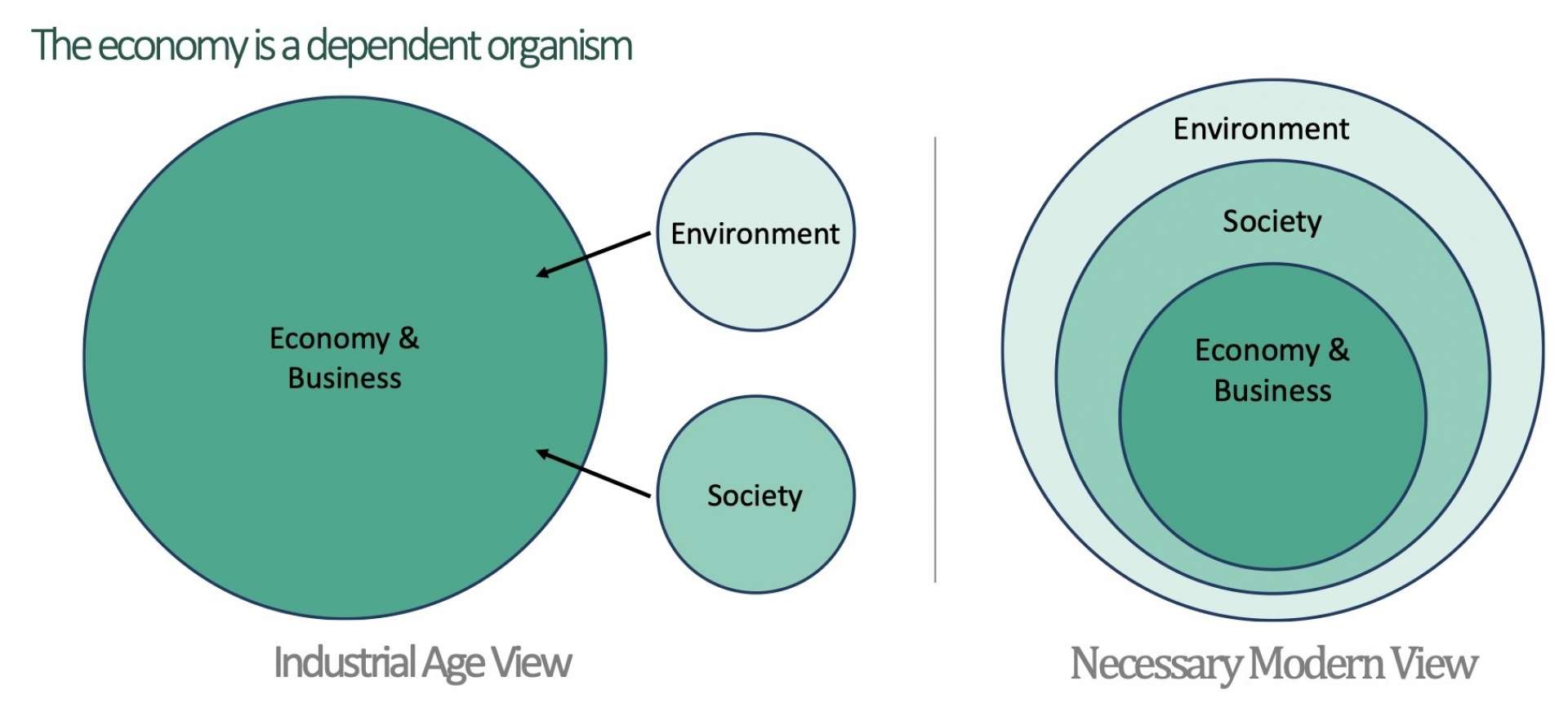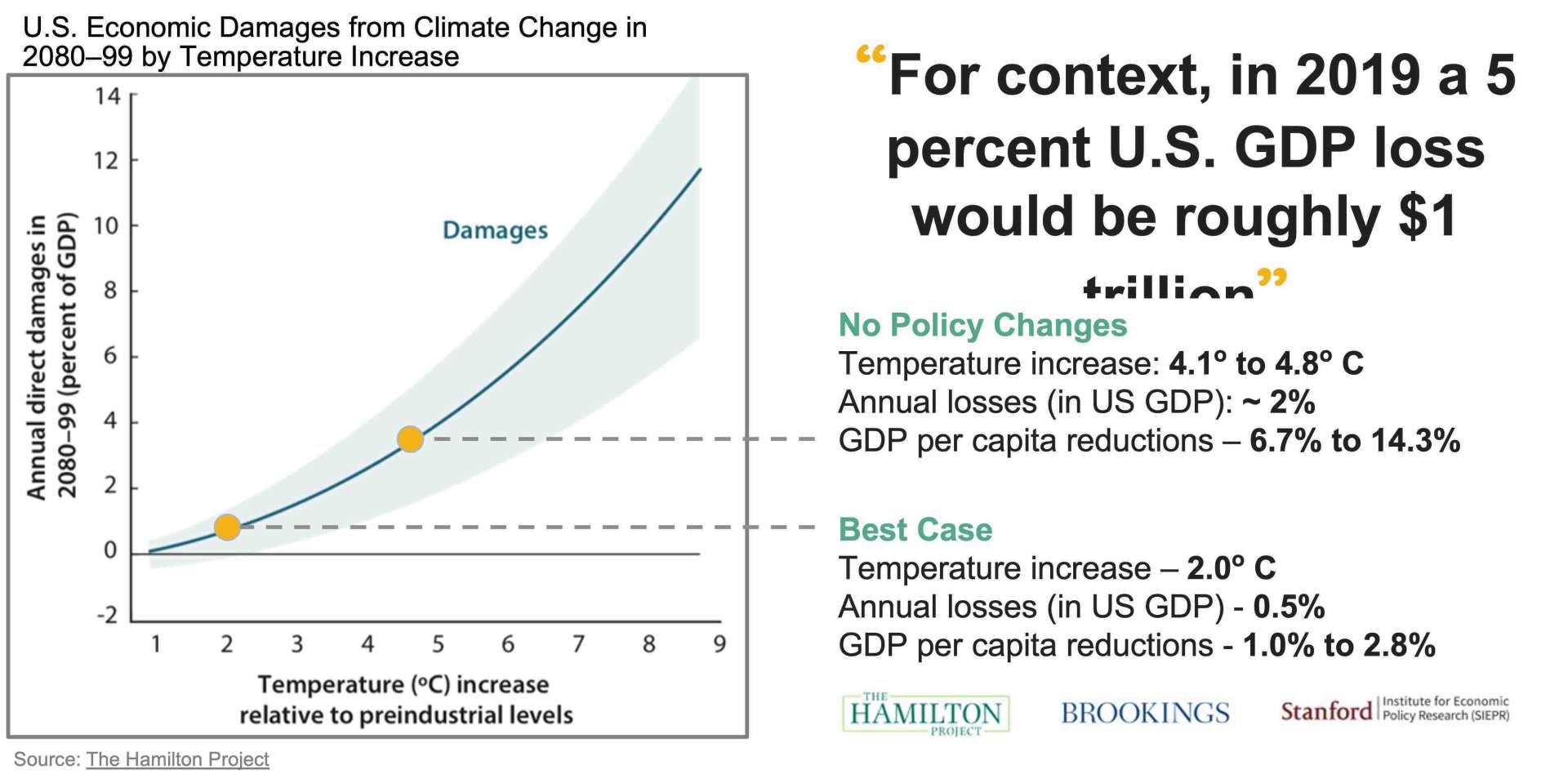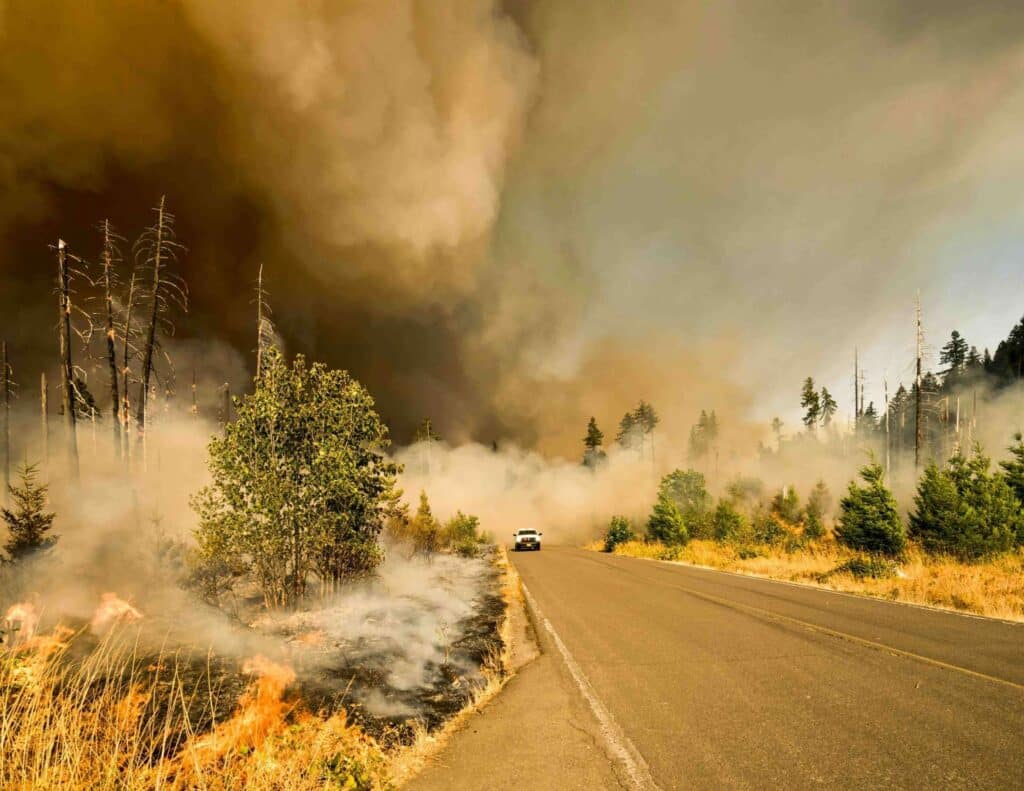The environment, community, and economy are interdependent
Perspectives about the role of business and the economy are shifting. An expanding and necessary view sees the economy as an integrated aspect of community and environment. Imagining those three areas – environment, community, and economy – as concentric circles of varying size based on their importance, the environment would be the largest. The economy is the smallest (see image) and is embedded in both community and environment. This asserts that a functioning economy is highly dependent on a healthy, flourishing environment and community. No environment, no community. No community, no economy.
Peter Senge, senior lecturer at the MIT Sloan School of Business (amongst other roles), and others make this point in their book The Necessary Revolution. They note the Industrial Age view was very different, with business owners viewing community and the environment as resources to exploit. For hundreds of years that viewpoint led to significant waste, pollution, and resource depletion

That model prioritized economic (e.g., GDP) growth with little regard to other impacts. While an underlying belief that economic growth is an engine for human well-being, our current situation – with high levels of poverty and homelessness, significant social and economic inequality, and environmental degradation – suggest otherwise.
Climate change will have material impacts to the economy
Viewing the economy as dependent on community and the environment does not mean that economic growth is unimportant. The point is that economic growth should consider broader implications to all stakeholders, and growth for the sake of growth has limited or no value. Surviving and thriving requires creating an inclusive and regenerative economy. To do that means adjusting the basis of the economy and taking meaningful action to prevent negative impacts for unexpected events (e.g., pandemics, severe weather).
Climate change will have impacts on our national and global economy. Research conducted by The Hamilton Project, a joint effort by the Brookings Institution and the Stanford Institute for Economic Policy Research (SIEPR), estimates the economic impacts of various warming scenarios in terms of GDP. In the best-case scenario – a temperature increase of 2 degrees Celsius by 2080-2099 – the US economy would experience annual GDP losses of 0.5 percent and GDP per capita reductions of 1.0 to 2.8 percent. The worst-case scenario – an increase of 4 to nearly 5 degrees Celsius – equates to annual GDP losses of approximately 2% and per capita reductions of around 7 percent to just over 14 percent. “For context, in 2019 a 5 percent U.S. GDP loss would be roughly $1 trillion.”

The Covid-19 pandemic may serve as a bellwether of sorts for the potential impact from climate change. In a May 2020 analysis, the CBO estimated a 5.6 percent drop in GDP while the Conference Board suggested a 5.7 to 6.1 percent decline in GDP due to climate change. While the pandemic represents a short-term shock and the economy is expected to recover, pandemics, severe weather events, crop failures, and other potentially significant impacts to the economy are expected to become a norm as climate change progresses. The Hamilton Project estimates seem reasonable based on our current experience during the pandemic and could prove to be underestimated.
This is real and consumers expect companies to combat climate change
The scientific consensus is that climate change is real, with NASA indicating that “97 percent or more of actively publishing climate scientists agree: Climate-warming trends over the past century are extremely likely due to human activities”. Most people understand this. In a 2014 Global Consumer Confidence survey conducted by the Conference Board and Nielsen, 70 percent of respondents acknowledged climate change as serious, making it the top threat facing the planet.
In the same survey, 81 percent of respondents believe that companies have a responsibility to combat climate change. Expectations in Europe and the United States were below 70 percent, with Asia-Pacific, Africa and the Middle East in the mid 80s, and Latin America at 94 percent. Emerging economies with expanding middle classes will have increasing buying power and will likely increase spending on consumer goods that in the past they didn’t have access to.
There is no shortage of surveys that support the 2014 Global Consumer Confidence survey and draw similar conclusions. However, many of those surveys were conducted during time-periods of relative stability where consumers weren’t constantly distracted by a dizzying array of social issues. Since the beginning of 2020, Covid-19, Black Lives Matter and other protests, and the presidential election had the potential to be major distractions for climate change because they are immediate issues, whereas climate change is relatively slow moving and a more distant threat.
The scientific consensus is that climate change is real, with NASA indicating that “97 percent or more of actively publishing climate scientists agree: Climate-warming trends over the past century are extremely likely due to human activities”. Most people understand this.
Genomatica, a company that makes bio-based materials to replace petroleum-based equivalents, conducted a survey in response to environmental changes their employees were noticing through the lockdowns. Their survey from mid-2020 showed that Covid-19 is not distracting Americans from thinking about climate change – 85 percent of respondents are thinking about climate change as much or more than they did before the Covid pandemic. Respondents also noticed positive changes in the environment, including reduced traffic and cleaner air.
There is a clear and obvious correlation between reduced traffic and cleaner air. Fewer cars on the road leads to fewer vehicle emissions, which in turn results in cleaner air. In April 2020, Los Angeles had some of the cleanest air in the country. And Delhi, which consistently has some of the most-polluted air in the world, recorded their best air quality in decades. Covid-19 has been a case study for how humans directly contribute to climate change, and how changing human behavior is a major part of the solution.
One other important aspect of the Genomatica survey is that 56 percent of respondents expect businesses and government to continue addressing climate change despite other issues that arise. In other words, consumers believe there are no excuses for inaction and ineffective leadership. This expectation is supported by an Edelman Consumer Trust Survey conducted in early 2020 that found 62 percent of respondents believe brands have a key role in helping the country survive the pandemic. Those same respondents – 65 percent of them – note that their perceptions of a company will be heavily-informed by how companies react to the Covid pandemic.
Given the similar results across the survey, it is reasonable to assume that consumer perceptions of companies increasingly will be shaped by how those companies address climate change.



